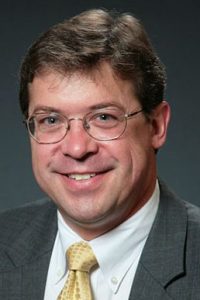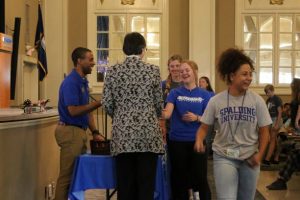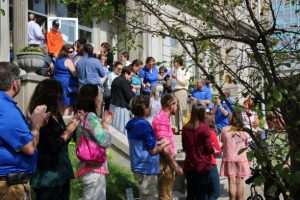Spalding University is pleased to announce the return of Brother Ignatius Perkins, OP, PhD, RN, an experienced nursing and health care leader and a scholar on bioethics, as the Chair of Spalding’s School of Nursing – a position he also held from 2003-05.
Bro. Perkins, who currently serves as Director of Provincial Administration for the Dominican Friars-Province of St. Joseph in New York, is a Spalding alumnus and former faculty member. During Perkins’ previous stint as Spalding’s School of Nursing Chair, he dually served as Dean of the university’s College of Health and Natural Sciences.
From 2010-15, he was the Dean of the School of Nursing at Aquinas College in Nashville, Tennessee, and his career of more than four decades includes numerous other administrative, teaching and research positions in health care and nonprofit settings. He has presented and been published dozens of times, often on issues related to bioethics and medical ethics, and he has served on countless boards and committees.
Perkins holds two degrees from Spalding – a Bachelor of Science in Nursing (1972) and a Master of Arts in Education (1981) – and is a past recipient of the university’s Caritas Medal, the highest award that a Spalding graduate can receive. He also earned a master’s degree in nursing and a doctorate from the Catholic University of America in Washington. Perkins also completed a postdoctoral research fellowship in primary care and clinical bioethics at Georgetown University in Washington, and he earned the National Catholic Certification in Health Care Ethics from the National Catholic Bioethics Center in Philadelphia.
“Brother Perkins is truly a rare find—he blends both an impressive background as a nursing leader, educator and bioethics scholar with a deep and intrinsic understanding of Spalding’s unique identity as a place where students come to learn to make a difference in their world,” Spalding President Tori Murden McClure said. “We are incredibly fortunate to have him and are thrilled to welcome him back to our campus.”
Learn more | Spalding’s School of Nursing programs
Throughout a venerable career, Perkins has received numerous awards and recognitions, including the Pillar Award at the Religious Brothers Conference in 2019, Faculty of the Year Award at Aquinas College in Nashville in 2015, and Lifetime Achievement in Nursing Leadership Award from College of Mount St. Joseph in Cincinnati. He is a Fellow with the NLN Academy of Nursing Education, the American Academy of Nursing, the New York Academy of Medicine, the Royal Society of Medicine and the National Catholic Bioethics Center, and he is an active member of multiple professional organizations, including the National Association of Catholic Nurses, the International Association of Catholic Bioethicists and the Catholic Medical Association. Perkins was also recently appointed as an Affiliated Scholar in the Pellegrino Center for Clinical Bioethics at Georgetown University in Washington.
As Chair of the School of Nursing, Perkins will oversee all of Spalding’s undergraduate and graduate nursing programs. He will begin work this month.
“It is a genuine privilege for me to once again to serve the faculty, staff, students and alumni of the School of Nursing at Spalding University,” Perkins said. “The School of Nursing has an enduring history; its prophetic role in reshaping our world by promoting human dignity, freedom and human flourishing though caring and compassion is the seminal gift the graduates of the School bring to a world in need of healing and hope.”
Meanwhile, Dr. Nancy Kern, a longtime Spalding faculty member who currently serves as the Interim Chair of the School of Nursing, has been named Spalding’s Bachelor of Science in Nursing Program Director.
Kern, who holds master’s and doctoral degrees from Spalding, has been a member of the university’s faculty for nearly 11 years. In recent years, during the state’s hepatitis A outbreak, Kern was a leader in volunteer efforts to provide vaccines to homeless citizens of Louisville. She has been an American Red Cross volunteer for nearly five decades.
“We are excited that Nancy Kern will become the director of our BSN program,” McClure said. “During her time at Spalding, Dr. Kern has helped train countless students to become compassionate nursing professionals. We thank her for the months she served as Interim Chair and look forward to the great work she’ll do in the future at Spalding.”



